Python
CS314
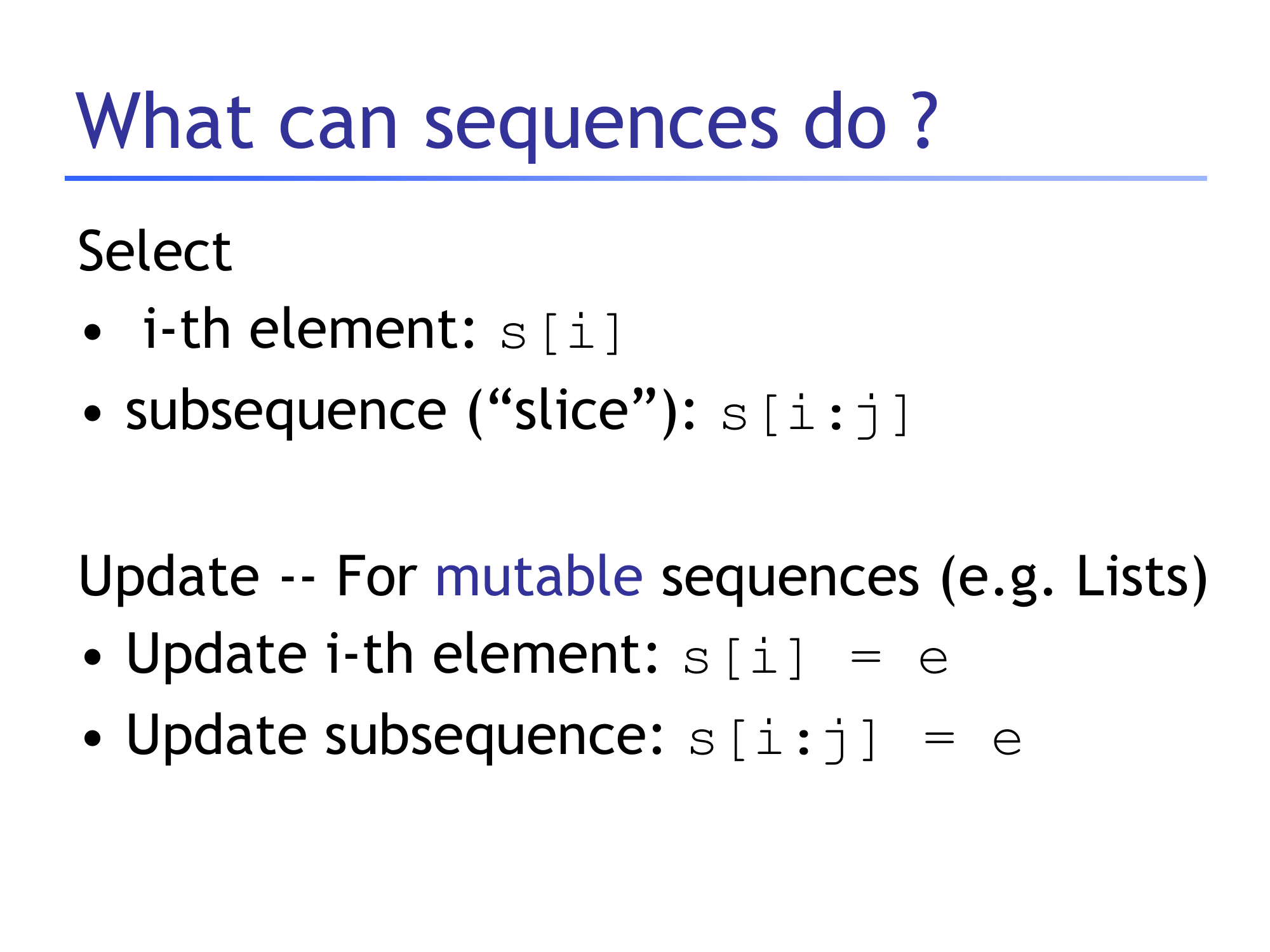

In [65]:
z = [1,2,3,4,5,6,7,8,9,10]
In [66]:
z[3:6] = ["a","b","c"]
In [67]:
z
Out[67]:
In [68]:
z[3:6] = ["a", "b"] * 2
In [69]:
z
Out[69]:
In [70]:
z[4:]=[]
In [71]:
z
Out[71]:
In [72]:
z[:0] = ["al", "be"]
In [73]:
z
Out[73]:

In [74]:
"a" in "cat"
Out[74]:
In [75]:
"a" in "entebbe"
Out[75]:
In [76]:
"a" in ("c", "a", "t")
Out[76]:
In [77]:
2 in [1,2,3,4,5]
Out[77]:
In [78]:
2 in [1,4,"92",2.4]
Out[78]:
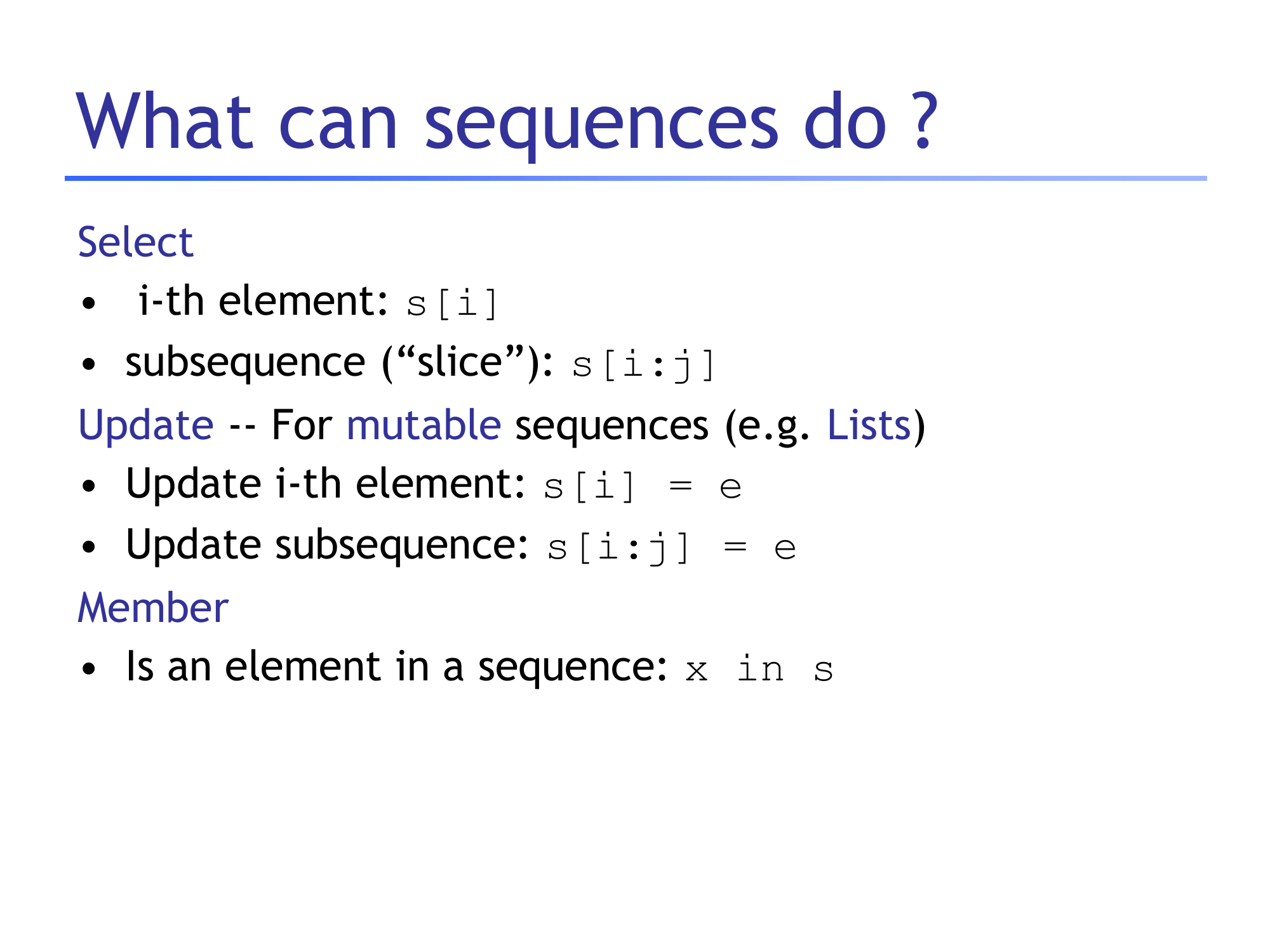

In [79]:
for x in ["Midterms", "ain’t", "cool"]:
print (x,len(x))
In [80]:
for c in "chimichanga":
print (c*3)
Quiz
What is the value of s after executing the following program?
- A 1
- B 6
- C 10.0
- D Error
In [81]:
s = 0
z = (1,2,3,4.0,"5") #tuple
for i in z:
s = s+i
In [82]:
s
Out[82]:
s = 0
z = (1,2,3,4.0,"5") #tuple
for i in z:
s = s+i
- Note that first 4 elements added!
- Dynamic Types!
- Run-time Type Error
In [83]:
s = 0
z = (1,2,3,4.0,"5") #tuple
for i in z:
s = s+float(i)
In [84]:
s
Out[84]:
Itetration + binding
If s is a sequence of tuples/sequences, then we can Bind to individual elements of "subsequences".
In [85]:
craigslist = [("alien",3.50), ("dinosaur",1.90),\
("quiz",100.50), ("quesadilla",3.00),\
("good grade in 314","priceless")]
In [86]:
for i,p in craigslist:
print ("One", i, "costs", p)
Old school For-loops
- There’s a simple way to write good-old for-loops.
for(i=0,i<10,i++){
print i;
}
- Built-in function: range
In [87]:
list(range(10))
Out[87]:
In [88]:
list(range(5,15)) #fixed upper bound
Out[88]:
In [90]:
list(range(15,5,-1)) #step
for x in range(10):
print (x)
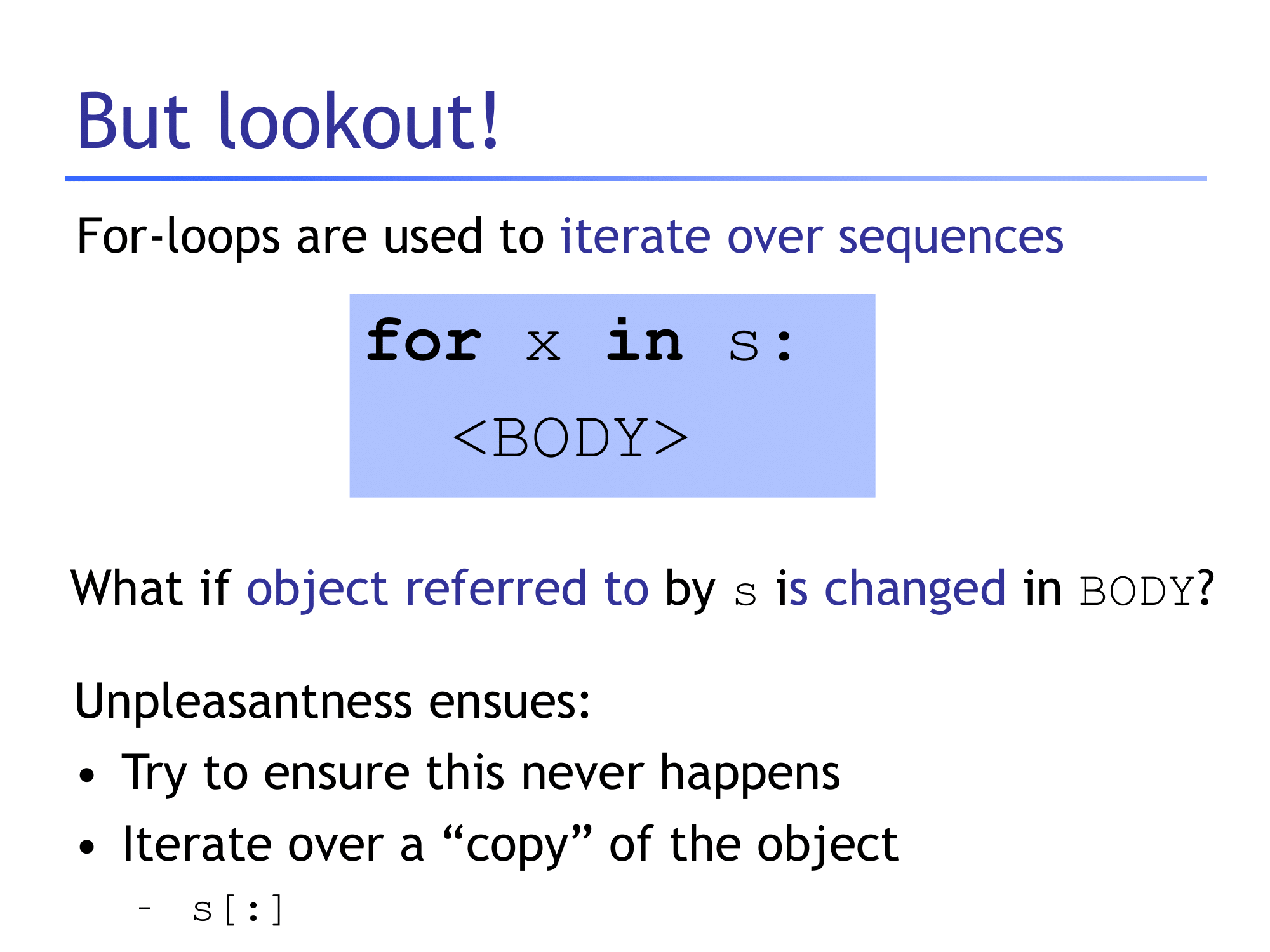
def funny_fun(s):
for x in s:
print x
s[len(s):] = [x]
- Add x to end object
- being iterated over!
- Loop forever
In [91]:
def dup_by_k(s,k):
for x in s:
print (x)
s = s + x*k
return s
dup_by_k("1234", 5)
Out[91]:
- Creates new object w/ x*k added at end
- Iteration object is what s "originally" referred to, which is unchanged
In [92]:
def dup_by_k(s,k):
for x in s[:]:
print (x)
s = s + x*k
return s
dup_by_k("1234", 5)
Out[92]:

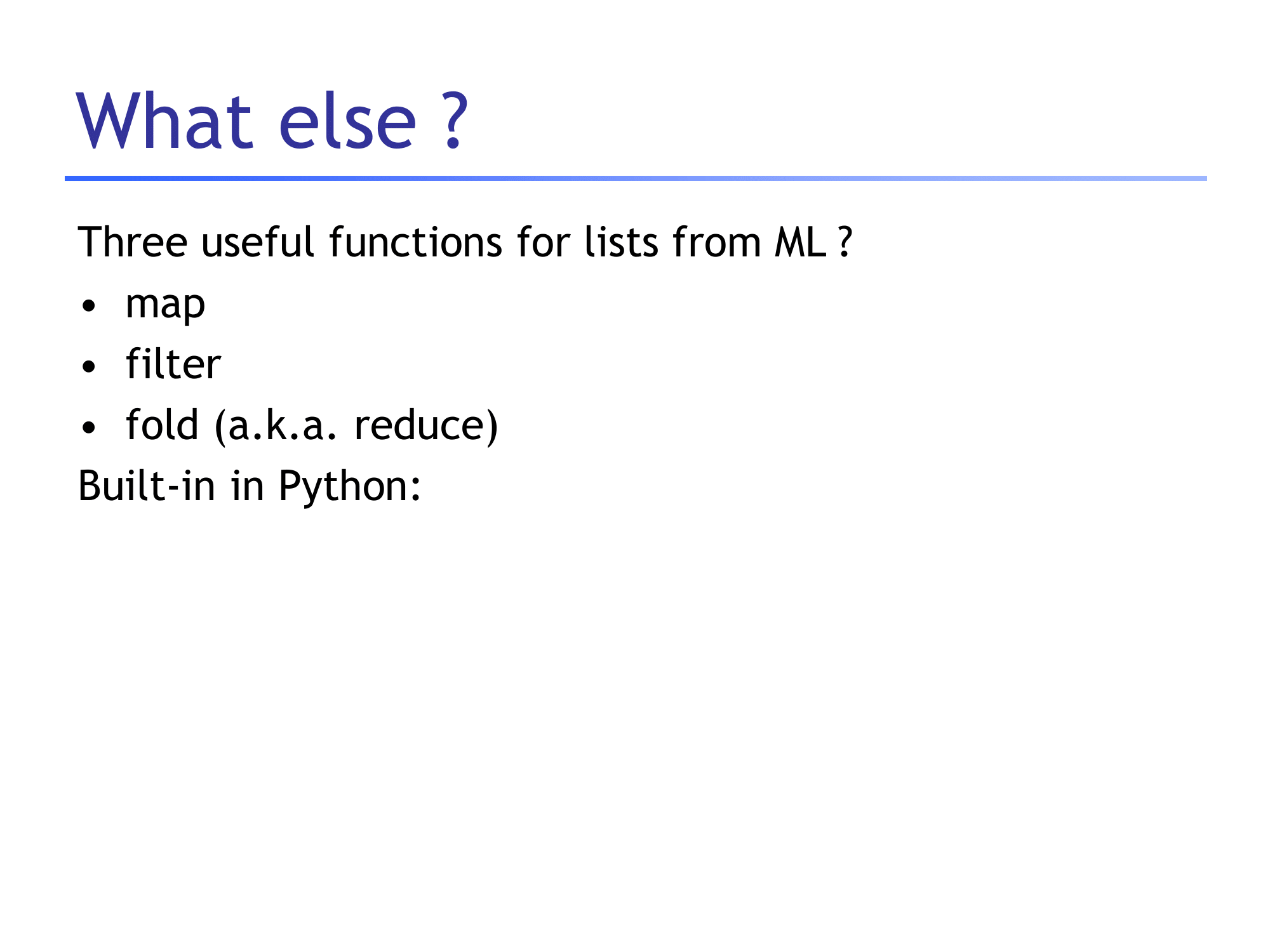
Map
In [93]:
def dup(x):
return 2 * x
In [94]:
z = range(10)
In [95]:
list(z)
Out[95]:
In [96]:
z = map(dup,z)
In [97]:
list(z)
Out[97]:
In [98]:
z = map(dup,"chimichanga")
In [99]:
list(z)
Out[99]:
- Works for all sequences, returns a list
Filter
- Works for all sequences, returns same kind of sequence
In [100]:
def even(x):
return int(x)%2==0
In [101]:
result = filter(even,range(20))
print(list(result))
In [102]:
result = filter(even,"1234096001234125")
print(list(result))
In [103]:
result = filter(even,(1,2.0,3.2,4))
print(list(result))
- Again, note the polymorphism that we get from dynamic types and conversion
Reduce
- i.e. fold
In [104]:
from functools import reduce
def add(x,y): # x is accumulator and y is list element
return x+y
In [105]:
l = range(10)
print ("l = ", l)
reduce(add, l, 0)
Out[105]:
In [106]:
def fac(x):
def mul(x,y): # x is accumulator and y is list element
return x*y
l = list(range(1, x+1))
print ("l = ", l)
return reduce(mul, l, 1)
In [107]:
fac(5)
Out[107]:
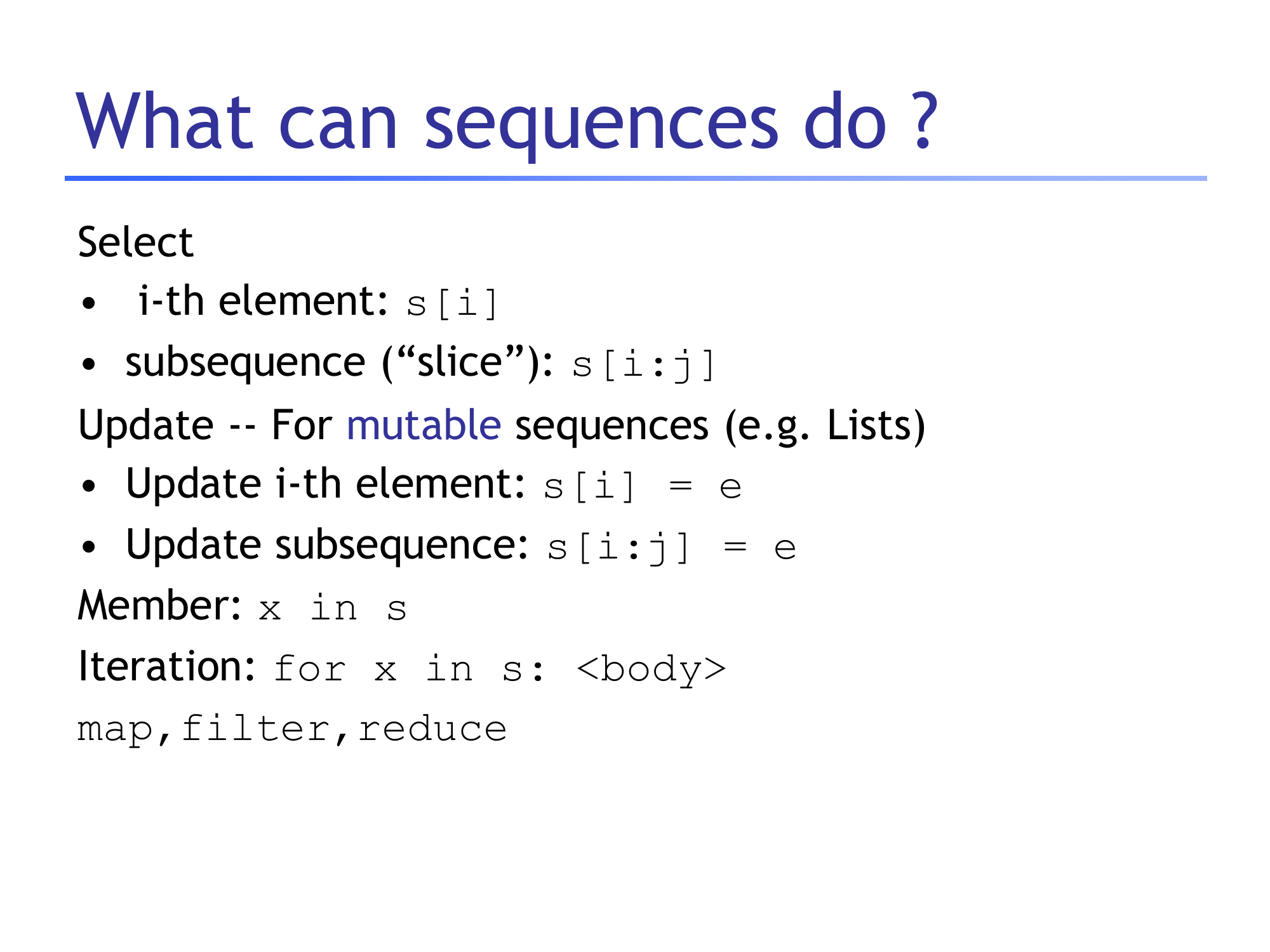
List Comprehension
- A cleaner, nicer way to do map-like operations
In [108]:
[ x*x for x in range(10)]
Out[108]:
In [109]:
[2*x for x in "yogurt cheese"]
Out[109]:
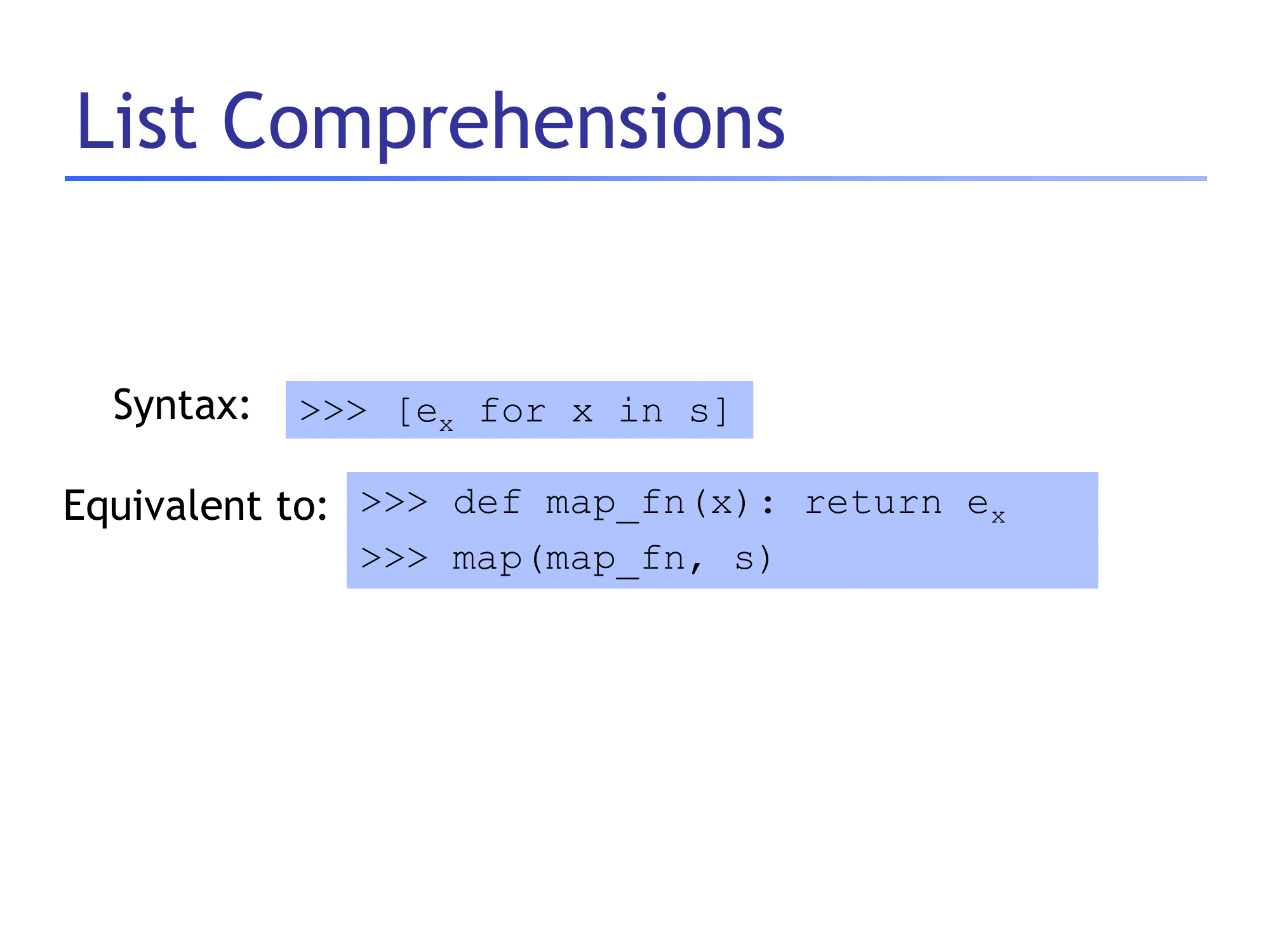
List Comprehension
- A cleaner, nicer way to do map+filter-like operations
In [110]:
[ x*x for x in range(10) if even(x)]
Out[110]:
In [111]:
[ 2*x for x in "0123456" if even(x)]
Out[111]:
In [112]:
craigslist
Out[112]:
In [113]:
[z[0] for z in craigslist if type(z[1])==float and z[1]<3.0]
Out[113]:
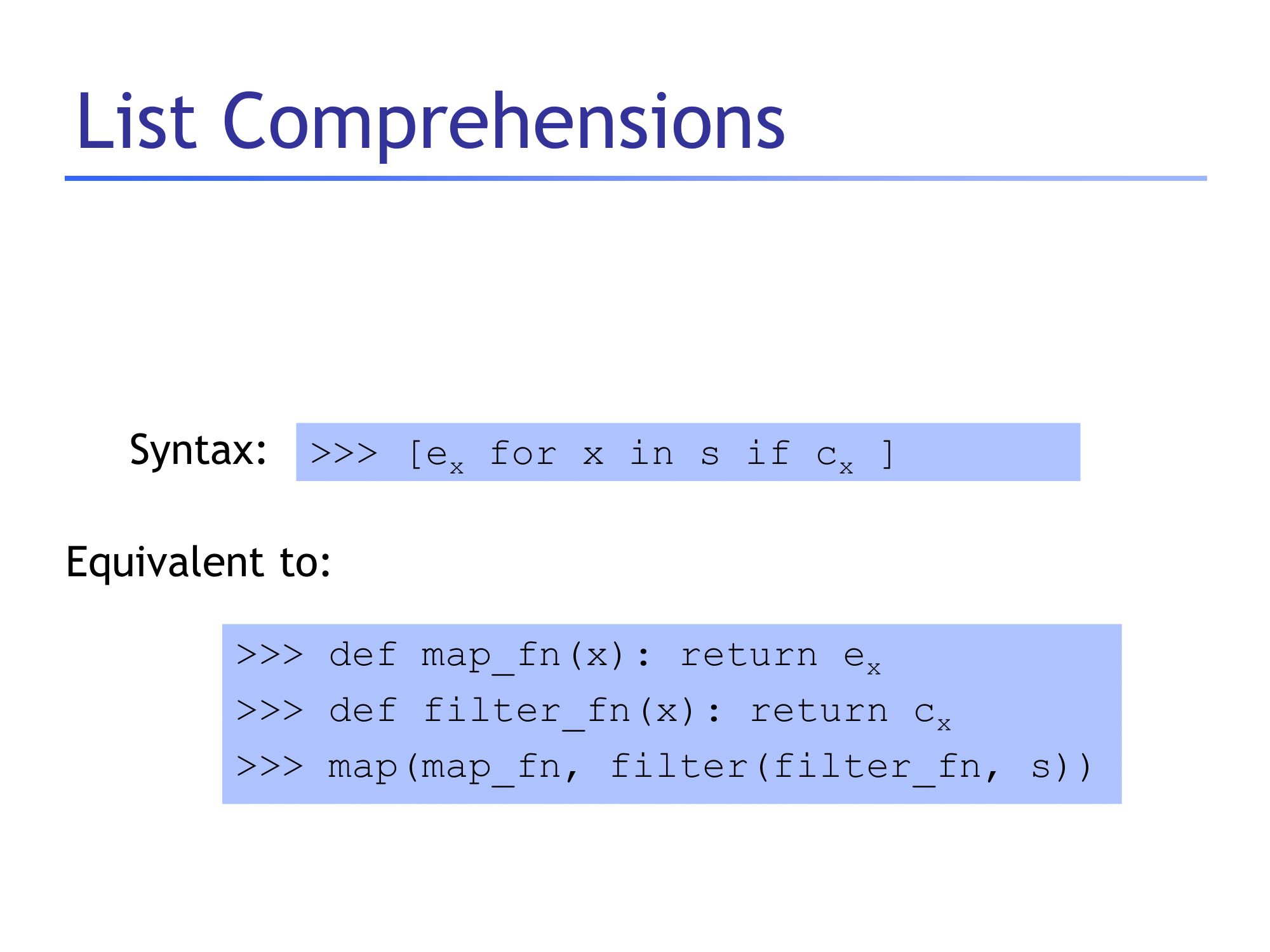
List Comprehension
- Can “nest” the
forto iterate over multiple sequences
In [114]:
[(x,y) for x in range(3) for y in range(3)]
Out[114]:
In [115]:
[(x,y) for x in range(3) for y in range(3) if x > y]
Out[115]:


In [116]:
def sort(L):
if L==[]:
return L
else:
l=sort([x for x in L[1:] if x < L[0]])
r=sort([x for x in L[1:] if x >= L[0]])
return(l+L[0:1]+r)
sort([5,3,1,4,2])
Out[116]:
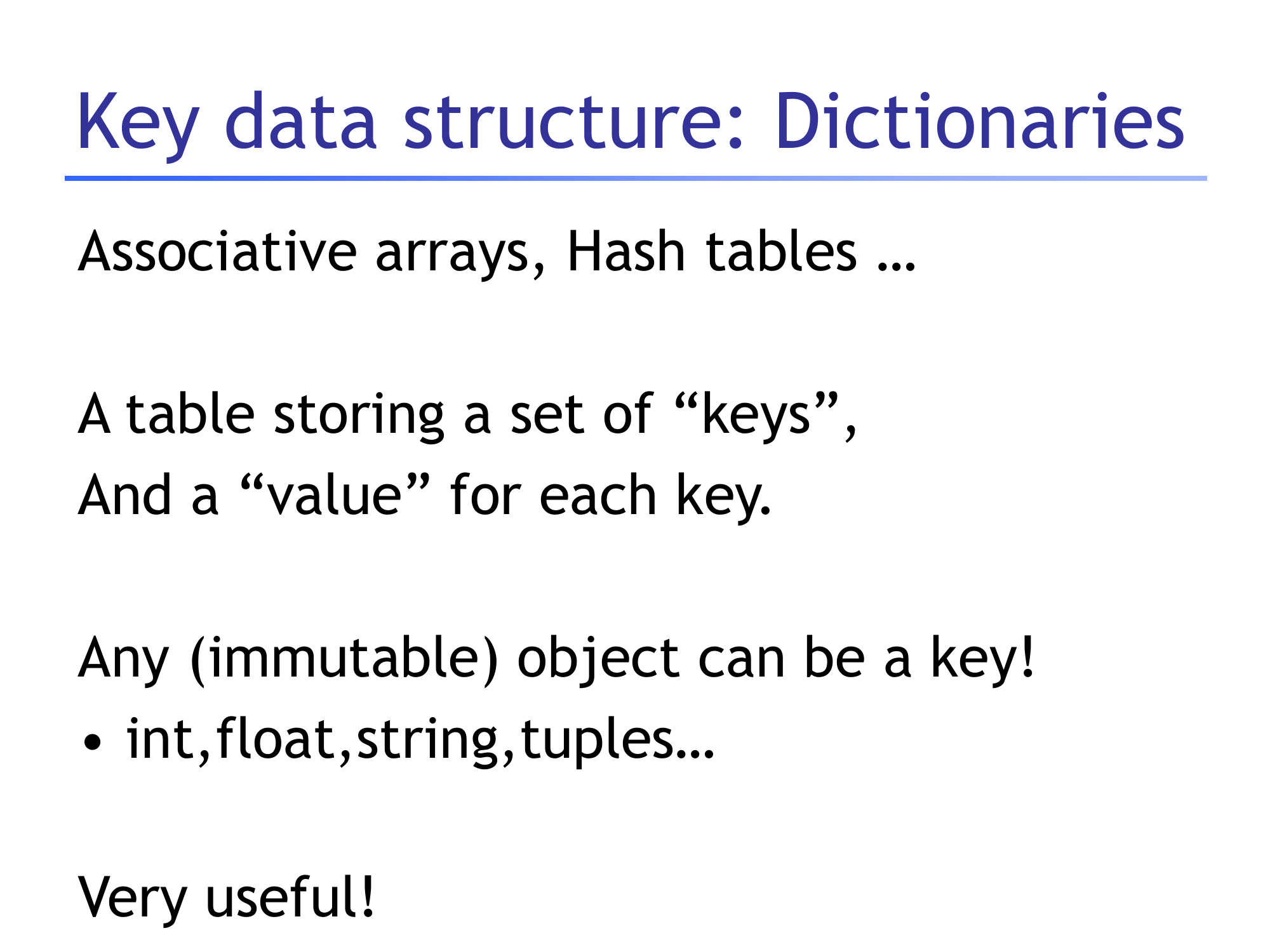
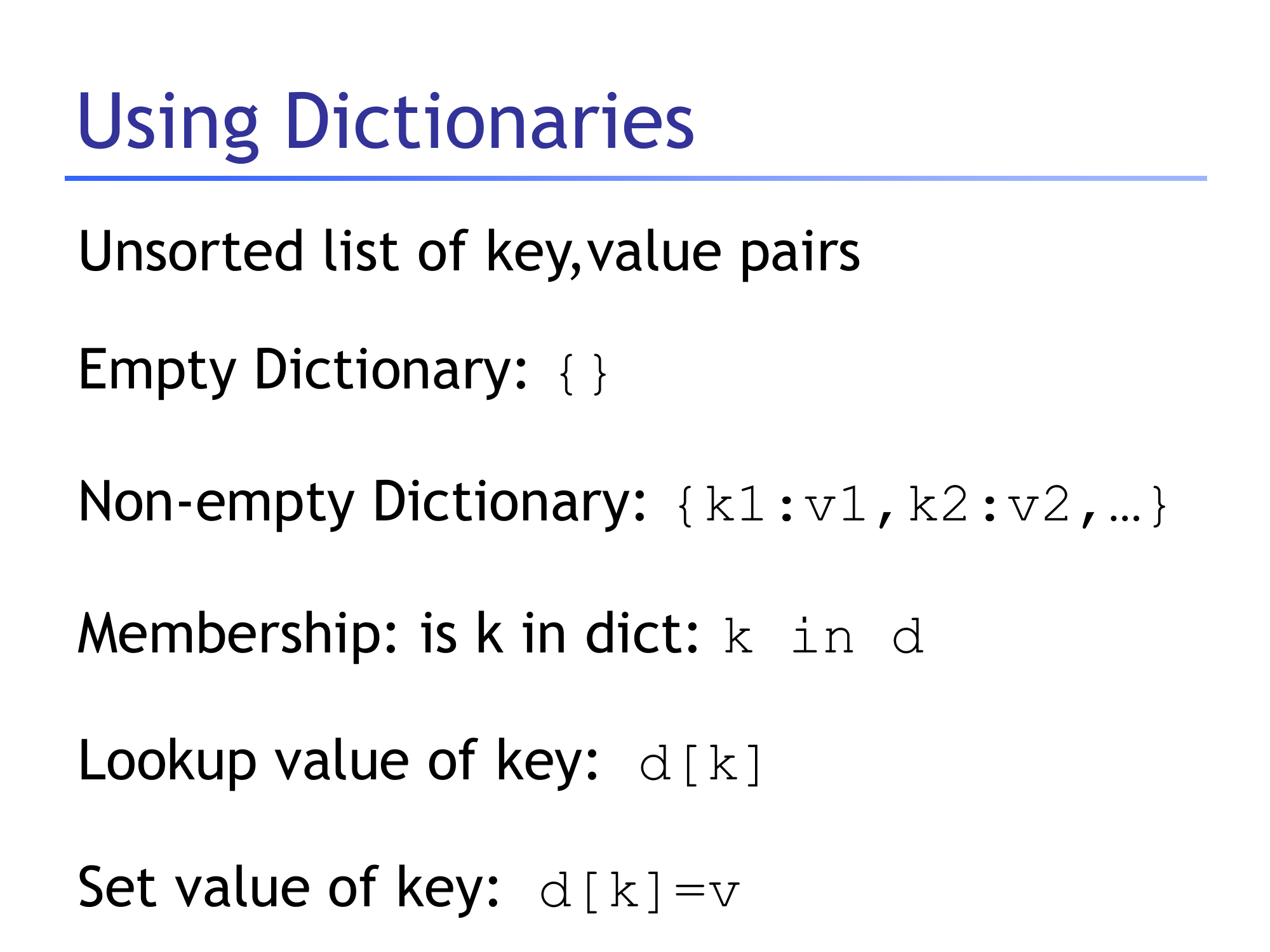
In [117]:
d = {}
d["ceviche"] = 3.95
d["burrito"] = 3.50
In [118]:
d
Out[118]:
In [119]:
d["burrito"]
Out[119]:
In [120]:
d.keys()
Out[120]:
In [121]:
d.values()
Out[121]:
In [122]:
def freq(s):
d={}
for c in s:
if c in d:
d[c]+=1
else:
d[c]=1
return d
In [123]:
def plotfreq(s):
d=freq(s)
for k in d.keys():
print (k, "*"*d[k])
return d
In [124]:
d=plotfreq([1, 1, 3.0, "A", 3.0, "A", "A", 1, 2, 3.0, 1, "A"])
In [125]:
d
Out[125]:
In [126]:
d = plotfreq("avrakedavra")
In [127]:
d
Out[127]: